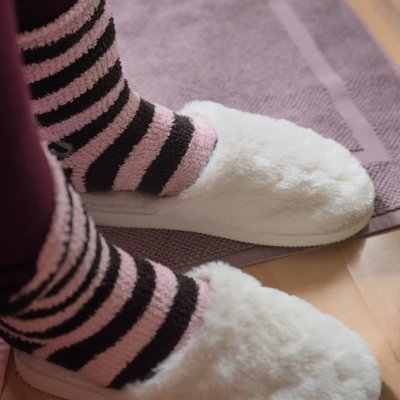stub(
stuhb
)A transitive verb is a verb that requires a direct object (e.g., I bought a book.).
1. (to strike)
a. machucarse
I stubbed my toe when I was going up the stairs.Me machuqué el dedo del pie al subir las escaleras.
b. no direct translation
This refers to an idiomatic word or phrase for which there is no word-for-word translation.
Bonnie stubbed her toe on the table and began to howl in pain.Bonnie se dio con el dedo del pie contra la mesa y se puso a gritar de dolor.
I wasn't looking where I was going and stubbed my foot on a stone.No miraba por donde iba y me golpeé el pie contra una piedra.
A noun is a word referring to a person, animal, place, thing, feeling, or idea (e.g., man, dog, house).
a. el cabo (M) (pencil, candle)
(m) means that a noun is masculine. Spanish nouns have a gender, which is either feminine (like la mujer or la luna) or masculine (like el hombre or el sol).
The room was dim, and the candles had burned down to stubs.La sala estaba en penumbras, y las velas había ardido hasta quedar reducidas a cabos.
b. la colilla (F) (cigarette)
(f) means that a noun is feminine. Spanish nouns have a gender, which is either feminine (like la mujer or la luna) or masculine (like el hombre or el sol).
Xavier sat smoking the stub of his last cigarette.Xavier estaba sentado fumando la colilla de su último cigarrillo.
d. el muñón (M) (limb, tail)
(m) means that a noun is masculine. Spanish nouns have a gender, which is either feminine (like la mujer or la luna) or masculine (like el hombre or el sol).
The doctor said that the stub had healed quite well since the amputation.La doctora dijo que el muñón había cicatrizado bastante bien desde la amputación.
a. el talón (M) (Latin America)
(m) means that a noun is masculine. Spanish nouns have a gender, which is either feminine (like la mujer or la luna) or masculine (like el hombre or el sol).
Regionalism used in Latin America: all the countries in South America, Central America, and the Caribbean. Does not include Spain.
Your stub shows how much of your pay was taken out for taxes and retirement.El talón muestra cuanto se dedujo del pago en concepto de impuestos y aporte jubilatorio.
b. la matriz (F) (Spain)
(f) means that a noun is feminine. Spanish nouns have a gender, which is either feminine (like la mujer or la luna) or masculine (like el hombre or el sol).
Regionalism used in Spain
I lost my check stub, and now the bank says I never deposited it.Perdí la matriz de mi cheque, y ahora el banco me dice que no lo deposité.
a. el talón (M) (Latin America)
(m) means that a noun is masculine. Spanish nouns have a gender, which is either feminine (like la mujer or la luna) or masculine (like el hombre or el sol).
Regionalism used in Latin America: all the countries in South America, Central America, and the Caribbean. Does not include Spain.
You can use the stub of your movie ticket to enter a competition.Con el talón de la entrada del cine se puede participar en un concurso.
b. el resguardo (M) (Spain)
(m) means that a noun is masculine. Spanish nouns have a gender, which is either feminine (like la mujer or la luna) or masculine (like el hombre or el sol).
Regionalism used in Spain
Sam always keeps the ticket stubs as mementos from the concerts he goes to.Sam siempre guarda los resguardos de las entradas como recuerdos de los conciertos a los que asiste.
Examples
Phrases
Conjugations
Other Dictionaries
Explore the meaning of stub in our family of products.
Random Word
Roll the dice and learn a new word now!
Want to Learn Spanish?
Spanish learning for everyone. For free.























